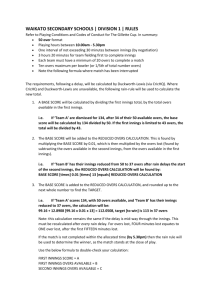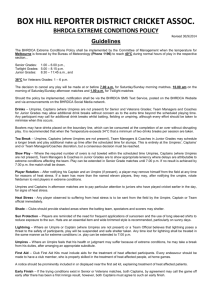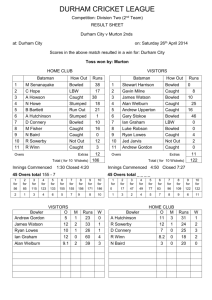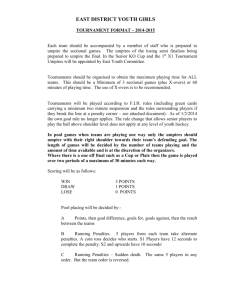Senior - Nelson Cricket
advertisement
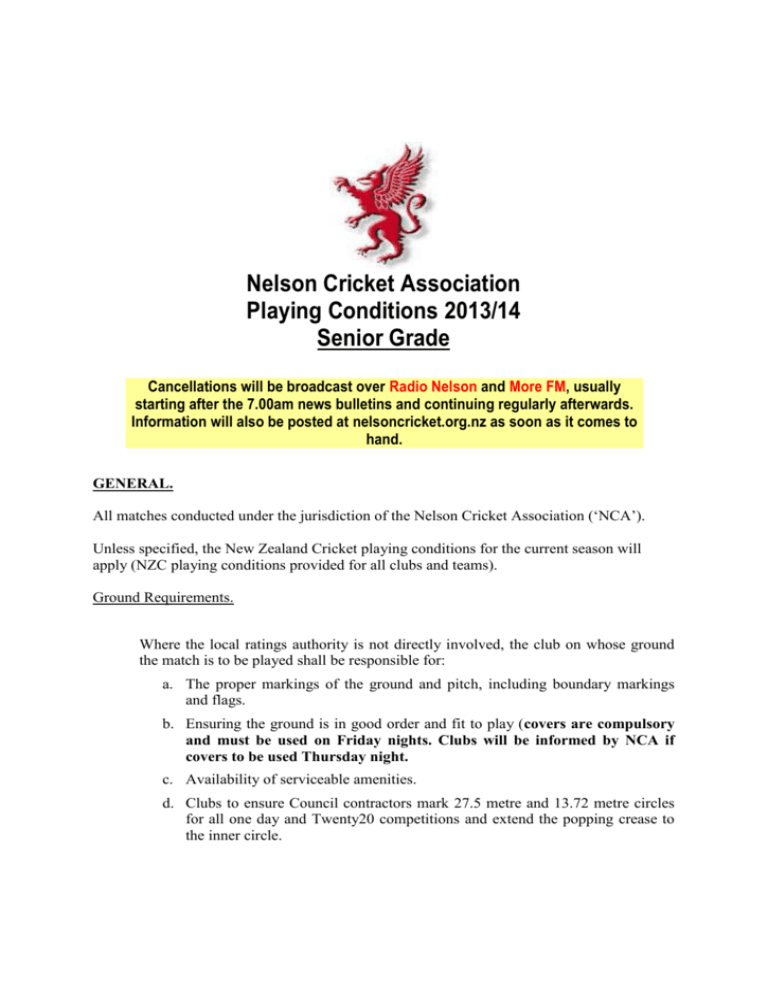
Nelson Cricket Association Playing Conditions 2013/14 Senior Grade Cancellations will be broadcast over Radio Nelson and More FM, usually starting after the 7.00am news bulletins and continuing regularly afterwards. Information will also be posted at nelsoncricket.org.nz as soon as it comes to hand. GENERAL. All matches conducted under the jurisdiction of the Nelson Cricket Association (‘NCA’). Unless specified, the New Zealand Cricket playing conditions for the current season will apply (NZC playing conditions provided for all clubs and teams). Ground Requirements. Where the local ratings authority is not directly involved, the club on whose ground the match is to be played shall be responsible for: a. The proper markings of the ground and pitch, including boundary markings and flags. b. Ensuring the ground is in good order and fit to play (covers are compulsory and must be used on Friday nights. Clubs will be informed by NCA if covers to be used Thursday night. c. Availability of serviceable amenities. d. Clubs to ensure Council contractors mark 27.5 metre and 13.72 metre circles for all one day and Twenty20 competitions and extend the popping crease to the inner circle. The home team shall ensure: e. Regulation stumps and bails are available and in good order. f. Lunch/Afternoon tea is provided for both teams. g. A scoreboard is provided. Where matches are played on neutral grounds, the team named first in the draw shall be considered the host team. In the event that any NCA final is to be played at a neutral venue then the team deemed to be top qualifier shall have first choice as to dressing rooms and other similar amenities. The home team shall ensure drinks are available at the appropriate times. Notification of teams. a. Before the toss in all matches, team captains shall nominate their respective players in writing and provide a team list to the umpires. b. In such two day matches, players that are not available for the second day’s play must be declared as such on the original team list before play commences on that day. Captains do not have to name replacement players. Any number of replacements may be made for the second day of a match. The player being replaced and his replacement shall be bona fide members of that club (and no other in New Zealand). The replacement player shall have full playing rights. However, both players may not bat in the same innings. In addition any player may be replaced due to exceptional circumstances such as family bereavement, injury or illness outside of each day’s playing hours. c. No player may be changed on the first day of the match, after the team nomination, without the consent of the opposing captain. d. No team shall have less than eight players or they will be required to default. The defaulting team shall be liable for any travel costs incurred by the winning team. e. At the conclusion of the match it is the captain’s responsibility to submit their umpires report via the NCA website no later than Tuesday 3pm. NO POINTS will be awarded to any team until it has provided their umpires report for the relevant fixture. f. If a senior team or its feeder team defaults during the competition the ‘NCA senior grade’; team is to be penalized two points in the competition. In addition, if the senior game is played no points may be gained by that senior team. In addition, club to be fined $150.00 (approximate ground fee charge for both teams for a senior club game). The toss. Captains shall toss for choice of innings on the field of play, not earlier than 30 minutes or later than 15 minutes before the scheduled (or rescheduled) start of play. Note: with the obvious exception of unfit conditions, where the start of any match is delayed through the fault of either team the time so lost shall be made up at the end of that day’s play if so desired by the non-offending team. The amount of time lost shall be agreed with and confirmed by the umpires before play commences. Cricket balls. Each team shall provide its own 4 piece, 156 gram club match or regulation cricket ball. Kookaburra balls only to be used. Fitness for play. a. In ruling on the fitness of the ground, weather and light for play, common sense must prevail at all times. b. Official umpires are the final arbiters of playing conditions as they relate to fitness for play, irrespective of the captains’ wishes. c. If no official umpires are present the captains must agree on any decision to start, continue or suspend play. If the captains cannot agree then the status quo shall continue to apply. Note: If at any time the condition of the ground, weather or light are so bad that there is an obvious and foreseeable risk to the safety of any player (batsman or fielder) or umpire, so that it would be unreasonable or dangerous for play to take place, play should be suspended immediately or not allowed to commence or to restart. The preamble, the spirit of cricket and captains’ responsibilities. 1. Responsibility of captains: the captains are responsible at all times for ensuring that play is conducted within both the spirit of the game and the laws of the game. Players conduct – in the event of a player failing to comply with instructions given by an umpire, or criticising by word or action the decisions of an umpire, showing dissent, or generally behaving in a manner which might bring the game into disrepute, the umpire concerned shall in the first instance report the matter to the other umpire and to the player’s captain, and instruct the latter to take action. 2. Fair and unfair play: according to the Laws of Cricket the umpires are the sole arbiters of fair and unfair play. The umpires may intervene at any time and it is the responsibility of the captains to take action where such action is reasonably required of them. 3. The umpires are authorised to intervene in cases of: time wasting; damaging the pitch; dangerous and/or unfair bowling; tampering with the ball; and any other action they deem unfair and against the spirit of cricket. 4. The spirit of the game involves respect for: your opponents; your own captain and players; the role of the umpires; and the game’s traditional values. 5. It is against the spirit of the game to: dispute an umpire’s decision by word, action or gesture; direct abusive language towards an opponent or umpire; indulge in cheating or any sharp practice, for example: (a) to appeal knowing the batsman is not out; (b) to advance towards an umpire in an aggressive manner when appealing; or (c) to seek to distract an opponent either verbally or by harassment with persistent clapping or unnecessary noise under the guise of enthusiasm and motivation of one’s own side. 6. Violence: there is no place for any act of violence on the field of play. 7. Players: captains and umpires together set the tone for the conduct of a cricket match. Every player is expected to make an important contribution to this at all times, both on and off the field of play. Code of conduct. The “Code of Conduct” as defined in the New Zealand Cricket Playing Conditions for the current season, together with any other existing Laws of the game that may also be applicable, shall apply in all grades of cricket under the jurisdiction of the NCA. Penalty runs. In the absence of official umpires the awarding of five (5) penalty runs will be restricted to laws 41.2, Illegally Fielding The Ball and 41.3, Ball Striking Fielding Team’s Helmet. Clothing. All senior two-day matches must be played in conventional cricketing whites. Any deviation from playing attire that fits this description must receive prior approval from the NCA Management Committee before the club concerned may wear such clothing in a senior twoday match. In senior one day and Twenty20 competitions all players must wear coloured clothing which accords with the recognised uniform of the club they represent. This rule also extends to batsmen wearing coloured pads as white balls will be used. In the event of any dispute regarding the suitability of clothing or pads in such fixtures, the official umpires shall be empowered to make any ruling they consider best reflects the intent underpinning the relevant playing conditions Alcohol. No alcohol shall be permitted on council grounds as per TDC and NCC by laws. No alcohol will be consumed during hours of play by cricket teams in any grade of NCA competitions. Senior two-day championship matches Hours of play. 1st session 2nd session 3rd session 11.00am to 1.30pm (2hr 30m) (lunch) 2pm to 4.10pm (2hr 10m) (tea) 4.25pm to 6.35pm (2hr 10m) a. Where an innings is concluded within 15 minutes of a scheduled interval the interval shall be taken immediately. The interval shall also include the 10 minutes provided for in the rules for a change of innings. b. If at the time of any scheduled break between sessions there is one wicket to fall in an innings, the umpires shall allow play to continue for a period not exceeding 15 minutes or until such time as the innings is concluded, whichever is the earlier. c. No play on day one of scheduled fixtures: if no play is possible on the first day of a match FOR ALL FIXTURES then day two of the fixture shall be limited to a contest for first innings points only – ie teams shall be limited to one innings each, and no outright points will be available. There is no limit to the amount of time or overs that a team may bat, and normal competition rules shall continue to apply in every other respect (including relevant bonus points). If play is possible on day one at any venue, ALL fixtures may then play for outright points, with the option of first innings points being forfeited and first innings bonus points carried over to the second innings. Both Captains must agree for this to take place. Overs per day. In senior two-day matches play on each day shall continue until the completion of a minimum of 110 overs or until such time as the scheduled cessation time is reached, whichever is the later. Three overs shall be deducted for each change of innings, unless the change coincides with a scheduled interval between sessions of play. If play is suspended, the minimum number of overs to be bowled for the remainder of the day shall be calculated on whichever of the following two bases produces the greater number of overs. Either: (a) One over for each 3.75 minutes of playing time remaining from the revised commencement time to the scheduled time for the close of play; or (b) The minimum number of overs agreed for the day, less the number of overs already bowled and less any allowances for the suspension of play. Note: where an innings ends during the course of an over, the partially concluded over shall count as one full over. Where play is suspended during an over, that over must be completed when play resumes and is in addition to the minimum number of overs to be completed. Over rates. For the allotted overs to be bowled within the standard hours of play teams are required to average 16 overs per hour in the field over the course of a full day’s play. The same principle applies to situations where the time available for play is reduced for any allowable reason on a pro-rata basis. In order to achieve the required over rate umpires and captains are expected to work together to manage the situation in a common sense manner. A “common sense manner” means that all persons will base their views on a reasonable interpretation of all the relevant circumstances affecting over rates on any given day. If, however, the umpires consider that any member or members of a fielding or batting side is acting in a way that deliberately frustrates the attempts of the umpires and the opposition to progress the match at a reasonable rate, then the umpires shall take steps to ensure the offending side is aware of the specific nature of their concerns. If the umpires continue to be of the opinion that their concerns are not being adequately addressed then they shall issue a formal warning to the captain of the offending team, placing that person on notice that failure by him to take reasonable steps to rectify the situation will result in the captain and any other player or person being placed on report for conduct contrary to the rules or prejudicial to the interests of cricket. Only one warning is to be given by the umpires. If they consider that the captain of the offending team or any person under his control has subsequently failed to take steps reasonably required of them then the umpires shall inform the captain and any other affected person of their intention to cite them for misconduct. In every situation where the umpires invoke their powers under this rule it is considered appropriate that the captain of the offending team will be the primary person to be cited for misconduct. If, however, the umpires consider other persons to be materially culpable then those persons shall also be cited for misconduct. Where any person is cited for misconduct under this rule the umpires will be required to compile a comprehensive written report pursuant to Rules 6 and 7 of the NCA Playing Conditions for consideration by the Management Committee under the relevant By-Laws. Last hour of the match. A minimum of 16 overs shall be completed in the last hour of a match (subject to conforming with requirements to complete the minimum allotted overs for the day). Where 16 overs or less remain to be bowled at 5.30pm the last hour shall commence at 5.30pm. Play is to continue until 6.30pm or until the required overs have been completed, whichever is the later, unless all umpires and captains agree otherwise. If more than 16 overs remain to be bowled at 5.30pm, play shall continue until the point where 16 overs remain to be bowled for the day. The last hour of the match shall apply from that time. Except where all umpires and captains agree otherwise, play shall continue until the 16 overs have been completed or until one hour has elapsed, whichever is the later. In both instances all persons should be aware that it is possible for more than 16 overs to be bowled before the cessation time under this rule has been reached. Overs per innings. There shall be no limit on the number of overs to be bowled in the first innings of either team. Similarly, there shall be no restriction on the number of overs that a team may bat in any innings of a match. However, bonus points will no longer be available to a batting team once it has completed 70 overs in its first innings. Points. Competition points shall be awarded for each match as follows: Outright win First innings win No first innings result Abandoned match Outright loss with first innings lead Tie on first innings Tie on first innings but outright win Outright tie Win by default First innings lead on first day Team defaulting 10 additional 5 3 each 3 each 5 5 15 3 each 21 3 -12 Bonus points (first innings only): Batting: 3 points available, as follows – 1st at 200 runs, 2nd at 225 runs, 3rd at 250 runs (all within 70 overs). Bowling: 3 points available, as follows – 1st at 5 wickets, 2nd at 7 wickets, 3rd at 9 wickets (no restriction on overs). Maximum points available per game: 24 Defaults. Any team defaulting a match shall forfeit 12 competition points. The defaulting team shall also forfeit any points it may have earned in the match it defaults, including bonus points. Under Rule 2(D) of the General Playing Conditions the defaulting team shall also be liable for any reasonable travel costs incurred by the winning team. A team winning by default shall be awarded Maximum 21 points. Re-grades. Any player who plays in three Senior matches (including 2 day comp, 50 over one day comp or 20/20 matches) shall be required to apply for a re-grade to return to or commence playing in a lower level of competition. Re-grades must be submitted to the NCA re-grade committee no later than 11am of the Thursday before the match in question. NCA re-grade committee to have a ruling by 5pm that Thursday. Two-day final. The championship final shall be contested by the two top qualifiers from the round-robin competition. Where two teams are tied for a qualifying position on points, the team which earned the most points in the game between the two tied sides shall qualify ahead of the other team. If the teams were tied in that game the team with the best runs-per-wicket differential for the round-robin competition shall qualify ahead of the other team. If more than two teams are tied for a qualifying position, the team with the most points from the matches between the tied sides shall qualify ahead of the other teams. If teams are still unable to be separated, the team with the best runs-per-wicket differential over the roundrobin competition shall qualify ahead of the other teams. The match itself shall be contested over two days and normal playing conditions shall apply. The final may be decided by a win on the first innings. In the absence of either an outright result or a result on the first innings the top qualifier shall be declared the winner of two-day competition. The final of the 2 day competition will be played at Saxton Oval. If Oval is unavailable then the final will be played at the top qualifiers home ground. In the event that the match cannot be played at the top qualifier’s home ground Rule 1(D) of the General Playing Conditions shall apply. Senior one-day championship matches. General conditions. Each innings will be limited to 50 six-ball overs, and each innings shall be completed within 3 hours and 30 minutes. A minimum of 20 overs per team is required to constitute a match. If this cannot be achieved then the match shall be declared a no result. Matches shall be of one day’s scheduled duration. Unless previously provided for by the NCA Management Committee the start time for all senior one-day matches shall be 11am. Result where innings for team batting second is interrupted. Where the innings of a team batting second is interrupted or otherwise unable to be completed, the Duckworth/Lewis method shall be applied to determine the winner. Hours of Play. Standard hours of play shall be 11am to the end of the first innings. Unless the umpires and captains all agree otherwise an interval of 30 minutes shall then be had for tea. Where there is a delayed start to the match the following calculations shall apply at the discretion of the umpires: Delayed start times Overs per team Bowling time Fielding restrictions Overs per bowler 12.00pm 12.30pm 1.00pm 1.30pm 2.00pm 2.30pm 3.00pm 3.15pm 46 42 38 34 30 26 22 20 3.00 hrs 2.45 hrs 2.30 hrs 2.15 hrs 2.00 hrs 1.45 hrs 1.30 hrs 1.20 hrs 13 overs 12 overs 11 overs 10 overs 9 overs 7 overs 6 overs 6 overs 1x10 4x9 2x9 3x8 3x8 2x7 4x7 1x6 5x6 4x5 1x4 2x5 3x4 5x4 3.45pm shall be the latest starting time. Ten minutes between innings applies in all matches where play is suspended. The objective should always be to reallocate the number of overs so that both teams have an opportunity to bat for the same number of overs. Calculations for the number of overs to be bowled should always be at the rate of four (4) minutes per over for the time remaining in the match. Points. Win Win by default Tie No result Bonus Point Loss Loss by default 4 points 4 points 2 points each 2 points each 1 point 0 points -4 points Bonus point: A team that achieves a run rate of 1.25 times that of the opposition shall be awarded one bonus point. A team’s run rate is calculated by reference to the runs scored in an innings divided by the number of overs faced. Where a side is all out, the number of overs used is the maximum number of overs that side was eligible to face. Where matches are shortened and targets revised using the Duckworth/Lewis method, bonus run rates and defensive targets are derived as a function of the revised target score and maximum overs. Senior Twenty20 championship matches. Unless otherwise advised by the NCA Management Committee, the rules for all senior Twenty20 fixtures shall be the same as those set out in the NZC Playing Conditions at the start of the season. 1. Points: Win Win by default Tie No result Loss Loss by default 4 points 4 points 2 points each 2 points each 0 points -4 points
